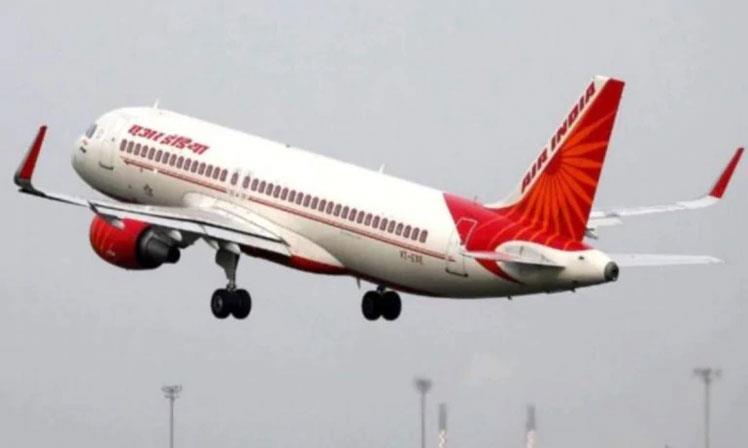
Rohan's ticket to Mumbai on the first flight from the UK under the Vande Bharat Mission only got confirmed late on the evening of May 8.
He packed most of the night. It wasn't easy to fork up £539, but he was "over the moon" because he's been desperate to be with his mother, who works for the BMC.
Two of her colleagues have caught the new coronavirus, but Rohan’s mother refuses to stop working because “people need her.”
And Rohan -- who came to Southampton to do a nautical course -- wants to be by her side, just in case something happens and he's unable to fly back.
"Finally, after such horrifying times, we've got relief after getting flight tickets to our home country," he told India Today TV.
COMING HOME
On May 9, the first of the seven Air India flights from the UK chapter of the Vande Bharat Mission -- a massive repatriation programme -- will take off for Mumbai from London's Heathrow Airport.
The next flights are to Bengaluru on May 10, Hyderabad on May 11, Mumbai on May 12, Ahmedabad on May 13, Chennai on May 14 and finally, Delhi on May 15.
Each flight has a capacity of 303 passengers but will carry a maximum of 250 in order to maintain social distancing.
Crew members and passengers will wear protective gear.
Tarandeep, along with his wife, six-month-old daughter and a few of his relatives, is glad to be on the flight but is very scared for his child.
Travel has contributed a great deal to the spread of the coronavirus. Tarandeep's main worry is his daughter but there's no option but to go back.
Along with 24 relatives from Delhi and Amritsar, he came to attend a marriage in London on March 13 and had return tickets for March 23. But the group got caught in the lockdown.
Their hotel closed on March 31. So they moved to an AirB&B that cost close to £8,000 per month. Food stretched their spending to close to £11,000.
"Other challenges faced included acquiring medicines...especially for the elderly couples," Tarandeep told India Today TV.
The group's medicine stocks lasted them two weeks after the their planned stay, after which it became "very difficult" to arrange for them without a prescription, he said.
The High Commission was "always available" to try and help, "especially during the final phase of exceptionally handling our repatriation after the Indian government decided on the same", he said.
CHALLENGES
But not everyone is as lucky as Rohan and Tarandeep.
Around 10,000 to 15,000 people registered their intent to go back on the High Commission's website, but a maximum of 2,000 people will be able to return on the seven flights.
For some, the fares -- £539 for economy and £1,493 for business class, plus paid quarantine on arrival -- are a big deterrent.
This alone should reduce the number of people choosing to go back by 25-30%.
Remember also that the process of repatriation is selective: only those falling in the "vulnerable category" are chosen by the High Commission -- in the current phase, at least. (The vulnerable category comprises people who are sick, elderly or have had a death in the family; pregnant women and tourists.)
Once this list is finalised -- and confirmations are received from passengers -- it is sent to Air India, which calls each person to do bookings.
Among the many who've been left angry, distressed, and in need of help are students.
It was students who first raised the alarm bells, asking to be taken back, but it is they who now stand last in the queue.
"We first raised [our voices], and then everybody joined our groups, and now we are the ones who can’t go back," said Rohit, who studies at Oxford Brookes University.
DIFFICULT TASK
All said and done, the process of selection hasn't been easy for the High Commission either.
A large team of people has been working for a while, first trying to pacify people who discovered that borders were closed, then trying to co-ordinate medicine and food supplies and accommodation for those in need, and finally -- the most emotionally draining job -- deciding who qualified for the list.
An order that came through in the last week of April prohibits sending mortal remains until a "no objection certificate" is received from the ministries of health and external affairs, possibly subject to the clearance of a Covid-19 test.
The logic of the rule is valid: it protects those handling the remains through the journey and on arrival. But it isn't a simple thing to explain to a mother who has lost a child or to a wife who's lost a husband.
There are families who've lost their loved ones in the UK and have had to perform funerals in the absence of the extended family due to the lockdown. Now, because of the quick turnaround of the flights, they won't be able to take the mortal remains back to India. For them, it is traumatic.
All the journeys made under the Vande Bharat Mission are commendable. Among the people who're making this possible, huge credit also goes to the crew members putting their lives at risk to save others'.
It hasn't been and won't be easy on anybody.
The only thing that pulls people through in such times is the kind, relentless human spirit.
Leave a comment: (Your email will not be published)